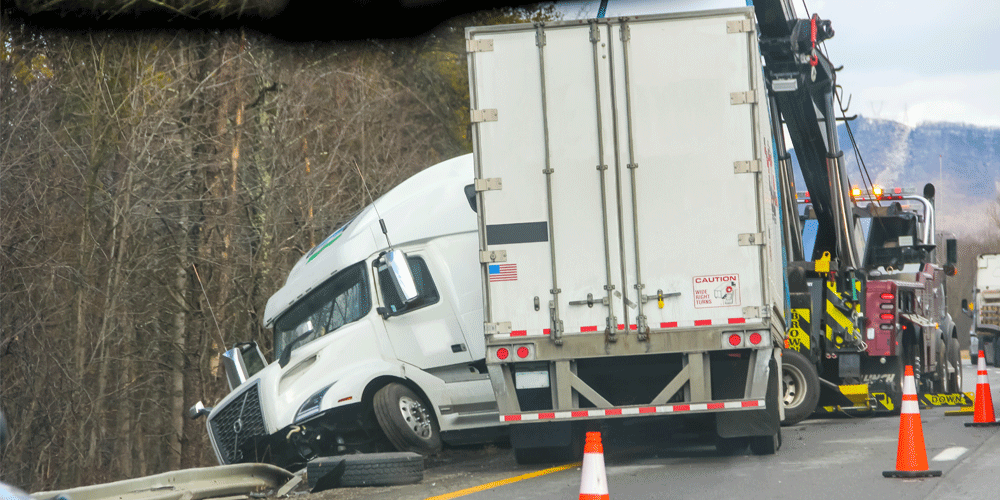Robbie came to ATS with ten years of transportation experience under his belt. He has worked at ATS for the last seven years as a driver consultant. He prides himself on using his industry knowledge to assist drivers in making the best decisions for themselves.
Standards are strict at a lot of top carriers. If you have a lot of violations and accidents, you’ll severely limit your ability to get offered a driving opportunity. You may not have your choice of the carriers you want to drive for. You may have to settle for a different carrier or wait until your record improves.
Obviously, that’s probably not something you want to do. More than likely, you want to work at the carrier at the top of your list who meets all your requirements.
As a commercial truck driver, safety is a top priority when you're on the road. Maintaining safety on the road can help you get offered an opportunity at the top carriers. However, if you have some violations or accidents on your record, you may run into difficulties.
That's why it's important to understand the Pre-Employment Screening Program (PSP) administered by the Federal Motor Carrier Safety Administration (FMCSA), which details your history of violations and accidents.
One of my duties as a recruiter at Anderson Trucking Service (ATS) is to review the PSP from drivers to ensure they meet our guidelines. If they don’t, we’re unable to work with them.
In this article, I’ll help you understand what the PSP is, what’s shown on the PSP, how you can see your PSP and what you can do to clean it up.
What is the PSP?
This program provides potential employers with a comprehensive report of your safety and inspection history, including any violations found during inspections and your DOT crash history.
By participating in the PSP program, potential employers can make informed decisions based on your qualifications and safety record.
Wondering why carriers look at this? Well, for starters, they want to see your driving habits. They want to ensure they’re working with safe drivers who can safely haul their freight. Secondly, the violations you receive from roadside inspections carry Compliance, Safety and Accountability (CSA) points that negatively affect the carrier.
A high carrier CSA score affects both the carrier and the driver. Carriers will find it more difficult to secure customers and get high-paying freight. That means drivers will have less freight availability and lower-paying freight.

What is Shown on the PSP?
It's important to know that not all PSP reports will contain the same information. Every driver’s record will be different depending on their history. However, here's a list of the information that is typically shown on your PSP that trucking carriers will be able to see:
- Crash History - information on any DOT crashes you've been involved in, including the date and location. This has to be classified as a DOT accident (meaning a vehicle had to be towed from the scene due to disabling damage, it resulted in an injury that required immediate treatment from the scene or it resulted in a fatality).
- Inspection History - details about any roadside inspections you've had, including the date, location, type of inspection and any violations found.
Remember, violations and warnings show up on your PSP record and they both carry over to the trucking company as CSA points.
How Can I See What’s on My PSP?
You have a couple of options for seeing what’s on your PSP.
First, you can go online to request and review your driving record. You’ll need to make an account first. Once you’ve made an account, you can view your five-year crash history and three-year roadside inspection history.
The Privacy Act through the FMCSA also allows you to request a copy of your PSP. There is a small fee for this.
When you apply at carriers, you can also request to see a copy of your PSP.
How Do I Clean Up My PSP?
Other than time, there are only a few ways you can try to clean up your PSP.
Violations and crashes will disappear from your record after a set time. Remember, the PSP only shows your violation history for three years. It shows your crash history for five. Therefore, you can simply wait for violations and crashes to drop from your record and put you within guidelines at the trucking company of your choosing.
Another path you can go down is to dispute violations using the FMCSA system, DataQs. This system allows you to request information about violations and to have that information reviewed by the FMCSA. Through this process, you can go in and dispute violations you don’t believe should be on your record. It’ll give you real-time tracking showing you where it stands.
For instance, maybe you believe a violation should be removed because you have evidence that the violation was inaccurate. You can dispute it.
It’s a good idea to regularly review your record to make sure there’s nothing on there that shouldn’t be.
It’s also important to note the difference between warnings and tickets. With a warning, you don’t get a fine and you don’t have to go to court. With a ticket, you do get a fine and you do have to go to court. However, a ticket does give you the chance to have your day in court and fight the ticket. That’s a big deal for a lot of drivers.
Because of this, some drivers will actually ask for a ticket over the warning. Both go on your record and come with CSA points for your carrier, but you can argue the cost of the ticket down and try to get it removed from your record.
Related: How your trucking carrier can help you if you get a ticket
How to Get an Opportunity at the Best Carriers
A PSP is like your resume as a truck driver. You want to make sure you have a clean resume with as many accolades as possible. For a driver, that means a record of safe driving, experience and carrier loyalty.
To keep your record clean, make sure you regularly review your PSP, dispute claims, and check that violations are removed from your record when they need to be.
Other than that, you’ll just need time.
In the meantime, it’s a good idea to focus on safe driving habits to ensure you don’t get any further violations.
You can also check out these tips to stand out to the best carriers.


